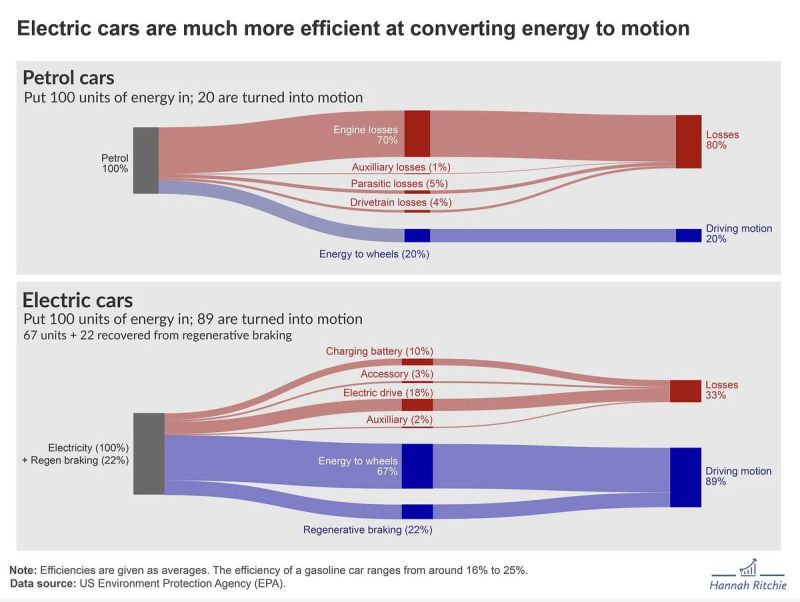Here is the cagematch to watch: efficiency of EVs (Electric Vehicles) vs Internal Combustion Engine Vehicles (ICE).
In the ongoing conversation about sustainable transportation, the efficiency of electric vehicles (EVs) compared to traditional gasoline cars is a game-changer.
A recent analysis sheds light on just how stark this difference is, highlighting the potential for electric cars to significantly reduce energy waste and contribute to the energy transition.
Here are 4 key highlights:
1. The Inefficiency of Gasoline Cars
Gasoline-powered vehicles are notoriously inefficient. For every 100 units of energy input, only about 20 units are converted into actual motion. This means that a staggering 80% of the energy from petrol is lost, primarily as heat from the engine. To put it into perspective, for every dollar spent on petrol, only 20 cents contribute to driving motion.
2. Electric Cars: A Leap in Efficiency
Electric vehicles, on the other hand, mark a substantial improvement in energy conversion. For every dollar of electricity, EVs deliver 67 cents of driving motion, with an additional 22 cents of energy recovered through regenerative braking. This results in an overall efficiency of 89 cents on the dollar—a significant leap from the 20% efficiency of gasoline cars.
3. Implications for the Energy Transition
The efficiency gains of electric vehicles are not just beneficial for consumers, who get more value from the energy they pay for, but also for the broader goal of decarbonizing transport. The common assumption that replacing gasoline with electricity in transport would require generating an equivalent amount of low-carbon electricity is flawed. Thanks to the higher efficiency of EVs, the actual electricity needed could be as much as four to five times less than the current gasoline consumption for road transport.
4. A Path to Sustainable Mobility
This efficiency advantage of electric vehicles underscores the feasibility of the transition to sustainable mobility. By significantly reducing the ‘wasted’ energy in transportation, EVs offer a path to not only lower consumer costs but also to a substantial reduction in the energy demand for transport. This, in turn, makes the goal of replacing fossil fuels with renewable energy sources far more achievable.
In summary, the journey from point A to point B is not just about the distance but about how efficiently and cleanly we can cover it.
The shift to electric vehicles represents a critical step in our journey towards a more sustainable and efficient transportation system.
What are your thoughts on efficiency gains with electric vehicles?
#sustainability #electricalvehicles #ev #automotive #automotivefuture
Data: US EPA/ Hannah Ritchie

